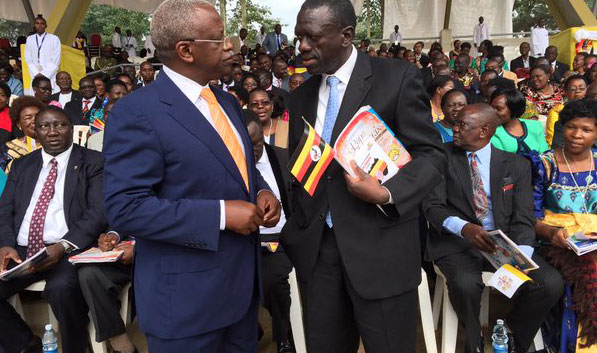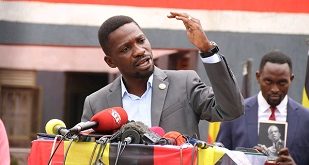
COMMENT | JOEL MUKISA | After the fall of the Berlin Wall, the American Political Scientist Francis Fukuyama in a lecture at the University of Chicago, and later in a famous article in National Interest Magazine and subsequently expanded into a book “the End of History and the last man” declared the ideational triumph of political and economic liberalism. Fukuyama was not alone. He was joining the columnist Charles Krauthammer who in the pages of Foreign Affairs, declared “The Unipolar Moment” in which America was the only hegemonic contender in global Affairs.
The collapse of the Berlin Wall was against the backdrop of a Reagan Presidency in the USA and a Magaret Thatcher administration in the United Kingdom. A new ultra financialized form of capitalism known as neo-liberalism or what is famously known as Structural Adjustment Programmes was unleashed and where need be forcefully imposed by both administrations. In the orthodox sense Neoliberalism is equated to a radically free market , maximized competition and free trade achieved through economic deregulation, elimination of tariffs, and a range of monetary and social policies favorable to business and indifferent toward poverty, social deracination, cultural decimation, long-term resource depletion, and environmental destruction.
These heinous effects have led to wide spread suffering among the African peasantry, who make up most of the continent. The peasantry lacked a vanguard party to articulate and voice these concerns into the political register. This dilemma is best characterized as one of abundant demand and short supply. An abundant demand for the vanguard party representing grievances of labour on one hand and the short supply of such voices. This may be surprising that this dilemma peaked at the advent of the multi party dispensation and frequent elections, which for some came to be the sum and total for democracy. What then explains this contemporary crisis?
I will discuss this crisis with perspective from Uganda,I hope the essay’s general significance to the broader African scene will be apparent. I will restrain my analysis to the Museveni years 1986- to date.
Opposition under the Neoliberal Spell
Until the end of his short lived political honeymoon, President Museveni who took power at the height of neoliberalism ( Uganda started implementing SAPs in the Obote II administration) didn’t meet serious opposition at least in the South of the country as the war raged in the North. The first incursion within the National Resisitance Movement (NRM) was the resignation of Kampala District Represantaive Wasswa Ziritwaula in 1989 from the National Resistance Council protesting the extension of “interim” four year arrangement. In succesion this was followed by Dr. Paul Kawanga Semwogerere’s presidential challenge in 1996 presidential elections that took place under the movement system.
It took a fellow bush combatant, former guerrilla and former National Political Commissar Kizza Besigye’s 1999 dossier and subsequent candidacy in 2001 to shake things up. The NRM state threw the kitchen sink at him in an election that many observers say was reminiscent of the violent 1980 election. Besigye suceedeed across his years in the political arena and in the subsquent elections ie 2006 & 2011, 2016 to expose the democratic credentials of the NRM as the political process became increasingly characterized by wanton abuse of human rights, political interference with the judiciary among other ignominies.
Besigye was to appear on the same ballot in 2016 with another disgruntled member of the bush war comrades , the former premier and NRM secretary general John Patrick Amama Mbabazi, who was fronted by a coterie of opposition political parties under the “ GO FORWARD” slogan. Mbabazi, who had decried Besigye’s candidacy in 2001 as “ jumping the que” had too, now, run out of patience. Perhaps due to age and ailments, with his knees now feeble, he could no longer wait in the proverbial que. In 2021, the young and vibrant ghetto song bird Robert Kyagulanyi Sentamu alias Bobi Wine rose to occasion and became the face of the opposition to NRM’s long tenure.
With the exception of Mbabazi whose stay in the opposition arena was shortlived, the other two protagonists ie Besigye and Bobi Wine, their politics appears to be anchored in pro-poor policies giving the appearance of a left ideological anchorage. The smokescreen quickly dissipates under close scrutiny of their global alliances, discourse analysis and policy document inspection which are couched in a neoliberal language. Take for instance Besigye’s campaign of “ My Land, My Life” that was aimed at sensitizing Ugandans about their land rights. This he did, while also maintaining close links with the Tories in the United Kingdom or more lewdly participating in the International Democratic Union. The contradiction of maintaining market zealot allies and a simulacra of left leaning narratives leaves more to be desired.
For Bobi Wine and team, one must inspect their 2021, 47 pages manifesto. Despite its lack of rigour and depth, the document that in typical neo-liberal hero worship begins with the Party leader’s face swamping an entire page should be taken serious not for the policy alternatives but the lack thereof. It seems, dear reader, like a copy and paste of the NRM manifesto. One sentence can summarize the manifesto “ Museveni policies are good but are poorly implemented with a mishmash of corruption.”
Can’t the same be said of the fourth estate? The Daily Monitor and its offshoot the Weekly Observer remain some the foremost critics of the Museveni regime. The high point of their critique being the Charles Onyango Obbo, Wafula Oguttu, Kevin Aliro and the Andrew Mwenda years. The group mutated from the Weekly Topic that was owned by Sapoba and Changombe group of the Kintu Musoke and Bidandi Ssali. Despite so much vitriol from Museveni as “an enemy” paper whose reporters he often threw in jail and a paper he denied government revenues through adverts for some time. Monitor was at an ideological level a key Museveni ally. All its firebrands were dyed in the wool right wingers that proceeded to get scholarships in Western universities due to their ideological bent. Mwenda’s disagreement for example that can be stretched to Monitor in general was a critique against a guarded opening of the market for the penetration of capital for the metropoles and a divesture of governement from all manner of business. Key to this, were the debates about the sale of the Uganda Commercial Bank that he rabidly supported.
Monitor and for the best part the Observer are critiques of the mismanagement of the debris of the state. If the Monitor took issue with privatization or SAPs, it was their shoddy and corruption laden implementation not SAPs per se. To them, this was a good policy basket that would suffer mismanagement. The beacon of this moment, Mwenda has since revised his opinions under the influence of a growing number of studies that seem to cast those policies as anti-development. This may explain why it has been easy for Mwenda and some of the members of the team to now work closely with the state. If anything, their disagreements must have ceased as the NRM state went on the liberalization binge.
Conclusion
History ended with the collapse of the Berlin Wall. Under the thongs of globalization a unipolar ideology of the world was passed across the globe. If the cold war provided alternatives to political alignments , the neoliberal age offers no options. It may not be suprising that parties across the vast continent with strict exception of Ethiopia, South Africa and to some degree Tanzania don’t differ in terms of articulation of fancy rhetoric and the quality of leaders. The NRM, RPF & ZANU PF leaders despite being amenable to the neoliberal ideology retain Marxist undertones reminscient of the politics of the cold war in which all of them participated.
From the above illustrations with the political opposition in Uganda it may seem as though it has no ideology but the lack of ideology is ideology itself. It is an endorsment of the prevalent neoliberal hegemony. This shuts down any alternate windows in the organization of the economy for example whose commanding heights are under the firm grip of multinational capital. Relations of production in the rural area remain unexplored and unthought about in the dominant discourse. Furthermore the discussions about the colonial structure of the state remain at best ‘forgotten’ at worst ignored. But the new political party, unlike its predecessor the nationalist party, is uninterested in such questions with long term implications. Like solutions to poverty, or social media adverts today’s political party does not see past, the next election. Even if it wanted, it lacks the necessary ideological knowledge prism from which to see the world.
It is safe to suggest that like in Europe or the USA in which the centre right and the centre left seem to agree on almost everything with fringe disagreements in the intersice framed along cultural lines that disippate under the lense of critical theory. Africa, too has birthed and bred its own extreme centre. A typical example being Kenya where politicians often cross the aisle and share the olive branch. This type of politics is lauded as progressive. It’s easy in the Kenyan context to join your adversary because you don’t have so much disagreement except on who is at the top. This world of no alternatives, I argue has stifled politics and caused increased voter apathy among the rural peasant subaltern who seem to think of politics in no meaningful way.
*****
Joel Mukisa is a lawyer, political and social commentator.
 The Independent Uganda: You get the Truth we Pay the Price
The Independent Uganda: You get the Truth we Pay the Price





